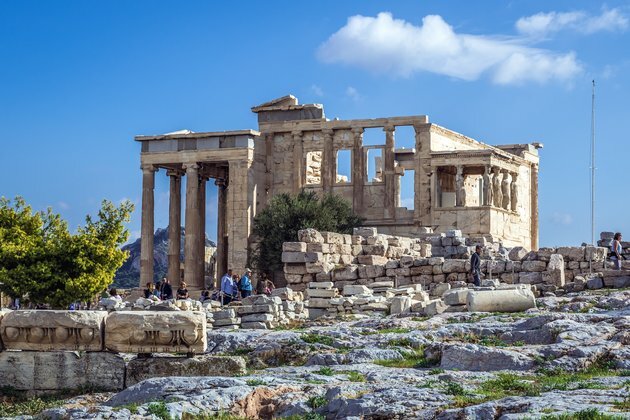A Turkish harem on the Acropolis? It's most likely a Greek myth
The Conversation
14 Jan 2022, 20:10 GMT+10

The Acropolis of Athens counts among the world's greatest architectural and artistic monuments. Visitors come to admire the marble buildings that testify to the glory of Ancient Greece more than two millennia ago. Typically, only little attention is paid to the site's rich medieval and Ottoman history. But one of the few stories commonly told about this period concerns the temple with six iconic sculptures of maidens, the so-called Caryatids.
Ancient Athenians built the temple with the Caryatids as the holiest shrine for Athena, the goddess of wisdom. In the medieval period, it was used as a church. But its fate supposedly changed dramatically following the Ottoman Turkish conquest of Athens in the 15th century. The story goes that the Muslim Turks had no interest in preserving the temple's sacrality, and instead converted it into something radically different: a harem. This was said to be the residence of the Turkish castle warden's wives and sometimes thought of as a place of seduction.
But my new research shows this information might need to be revised. As part of this study, I analysed all relevant historical sources about the Acropolis from the Ottoman period. It turns out the idea of a Turkish harem here originated in the 17th century with two visitors from France and England. They published popular books in which they asserted that the building was a harem. These visitors, however, did not even enter the building and gave contradictory, possibly speculative information about it.
Fantasy or not, the notion of the harem has long fascinated western audiences, who've enjoyed these exotic tales of the Orient. Later authors simply repeated the information. This was even the case after the building had fallen to ruin in the Venetian bombardment of 1687.
My research also included several understudied Turkish sources. None of these mentions anything like a harem in the temple of the Caryatids either. But they do seem to say that it was in use as some kind of palace. All in all, there is little to suggest that the temple was ever converted into a place of erotic encounters.
Harems and temples
Stories about harems in the temple of the Caryatids already existed in the time of the ancient Greeks - many centuries before the Turks arrived. The striking Caryatids themselves appear like petrified women in front of the building. They likely played a role in the creation of such tales. Time and again, visitors to the Acropolis have given meaning to the mysterious building based on these sculptures.
Anthropological research shows that impressive statues like the Caryatids can stir the imagination, prompting wild stories that are sometimes mistaken for "factual" history. To the casual onlooker, the Caryatids could serve as evidence for the harem.
But the idea of the harem is also deeply problematic as it continues a long-lived western stereotype of the Turks as violent, sacrilegious barbarians. This stereotype originates in the many centuries of warfare between Christian European countries and the Muslim Ottoman Empire. Then too developed the popular fantasy that Turkish harems were mysterious, erotic places of seclusion.
The idea that the temple of the Caryatids became a decadent harem fitted right into this negative western sentiment about the Turks. That sentiment had dire consequences: shortly after the young Greek state's conquest of Athens in the 19th century, it led to the complete annihilation of the Turkish town that stood on the Acropolis. The same attitude led Lord Elgin, a British nobleman, to remove many Acropolis sculptures in the early 19th century - including one of the Caryatids.
Imprisoned sister
Still today, these sculptures reside in the British Museum in London, to the dismay of many (in Greece and elsewhere), who wish to see them returned to Athens. Though the Caryatids still continue to fire the imagination: local legend claims the marble girls who remain in Athens can be heard crying out at night in lament for their imprisoned sister in London.
The notion of a Turkish harem ties in with the current meaning of the Acropolis as an important archaeological site and a symbol of Greece and western civilisation. But this symbolism has a dark side: anti-eastern stories continue to be told at the expense of the Turks.
The Turks are typically portrayed as the villains of the Acropolis, but my research shows this is a crude interpretation of more than three centuries of Turkish presence. And it doesn't do justice to their actual attitudes: historical sources show that the Turks were not always the violent barbarians they are often made out to be. Rather, they were just as fascinated about the antiquities as modern tourists are today.
Author: Janric van Rookhuijzen - Classical Archaeologist and Postdoctoral Research Fellow, Utrecht University 
 Share
Share
 Tweet
Tweet
 Share
Share
 Flip
Flip
 Email
Email
Watch latest videos
Subscribe and Follow
Get a daily dose of Greek Herald news through our daily email, its complimentary and keeps you fully up to date with world and business news as well.
News RELEASES
Publish news of your business, community or sports group, personnel appointments, major event and more by submitting a news release to Greek Herald.
More InformationInternational Business
SectionOver 60 companies named in UN report on Israel-Gaza conflict
GENEVA, Switzerland: A new United Nations report alleges that dozens of global corporations are profiting from and helping sustain...
Persson family steps up H&M share purchases, sparks buyout talk
LONDON/STOCKHOLM: The Persson family is ramping up its investment in the H&M fashion empire, fueling renewed speculation about a potential...
Shell rejects claim of early merger talks with BP
LONDON, U.K.: British oil giant Shell has denied reports that it is in talks to acquire rival oil company BP. The Wall Street Journal...
Australian PM rejects US pressure to ease biosecurity rules
SYDNEY, Australia: Australia will not ease its strict biosecurity rules during trade talks with the United States, Prime Minister Anthony...
Beijing conference spotlights esports as new engine of digital economy
BEIJING, July 5 (Xinhua) -- No dull rows of chairs and tables, no endless slides of charts and numbers -- instead, a gleaming statue...
Sudan's Khartoum strives to recover amid ongoing civil war
KHARTOUM, July 5 (Xinhua) -- After more than two years of devastating conflict, Sudan's capital Khartoum is slowly emerging from the...
Mediterranean
SectionEarly heatwave grips Europe, leaving 8 dead and nations on alert
LONDON, U.K.: An unrelenting heatwave sweeping across Europe has pushed early summer temperatures to historic highs, triggering deadly...
Turkey, France battle wildfires amid early Europe heatwave
ISTANBUL/PARIS/BRUSSELS: As searing temperatures blanket much of Europe, wildfires are erupting and evacuation orders are being issued...
Meenakshi, Pooja, Hitesh lead charge as eight Indians set to fight for gold at World Boxing Cup
Astana [Kazakhstan], July 5 (ANI): India's boxing contingent at the World Boxing Cup, Kazakhstan 2025, will be vying for at least eight...
Numbers etched in history: A deep look into Gill's historic Birmingham outing with the bat
Birmingham [UK], July 5 (ANI): Indian skipper Shubman Gill concluded a record-breaking Birmingham Test against England with breathtaking...
"Arey bhai kal ya parso hi toh story daaali thi": Indian stars express awe, ridiculousness at Gill's monstrous run in England
Birmingham [UK], July 5 (ANI): The Indian cricketing fraternity expressed happiness as skipper Shubman Gill continued his monumental...
League of Legends: Gill surpasses Gavaskar, Virat, joins Lara, Sangakkara, Gooch following historic double-ton, century combo at Birmingham
Birmingham [UK], July 5 (ANI): Indian skipper Shubman Gill's dreamy, record-breaking continued to tire out bowlers and statisticians...













